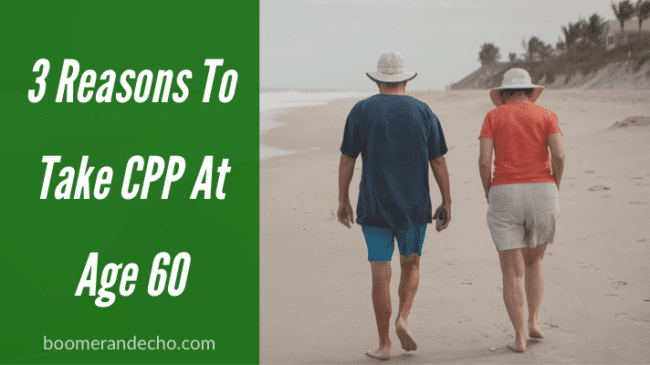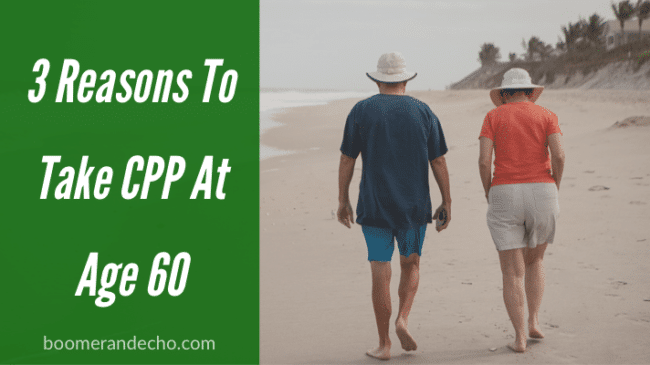3 Reasons To Take CPP At Age 60


It’s generally not wise to voluntarily take up to a 36% reduction in income, especially if that income is paid for life. But that’s exactly what happens when retirees choose to take CPP at age 60.
I’m a big proponent of delaying CPP up to age 70 to help protect against longevity risk and enhance your monthly pension benefit in retirement. Only a small percentage of retirees do so, however, as many prefer to take CPP as soon as they’re eligible.
Taking CPP early may not be the most optimal financial decision but there are a few cases where it can make sense. Here are three reasons to take CPP at age 60:
1). You Need to Eat and Pay the Bills
Maybe you were laid off in the latter stages of your career and struggled to return to the workforce, or you had to retire early due to poor physical health. Whatever the case, you’re about to turn 60 and need to build an income stream.
Simply put, without sufficient income or personal savings to carry you through your 60s you may have no choice but to take CPP as early as possible.
The earliest you can take your CPP benefits is one month after your 60th birthday. Doing so means a 36% permanent reduction in your monthly benefit, but that’s still money in your pocket today.
The maximum payment amount for taking CPP at age 65 is $16,375.20 per year (2024). That amount would be reduced to $10,480.13 per year if you elect to take CPP at 60.
Taking that extra $10,000 at age 60 could mean the difference between meeting your retirement income goals or not, and that needs to be weighed against having to wait five years for an extra $5,900 (or so) a year.
Finally, if you’re sure that you will be eligible for the Guaranteed Income Supplement (GIS) once you reach 65, it’s generally a good idea to take CPP at age 60.
2). You Have a Reduced Life Expectancy
The biggest mystery in retirement planning is that we don’t know how long our money needs to last because we don’t know when we’ll die.
By age 60 you may have some idea. Whether it’s genetics, poor health, or the results from your 23andMe test, if you have any reason to suspect a shortened life expectancy then taking CPP at 60 can make good financial sense.
Understand your breakeven point for taking CPP early. For instance, you’ll be ahead financially if you take CPP at age 60 and don’t live past age 69. If you make it to 85, then the optimal age to take CPP is 69.
For context, a 60-year-old Canadian, on average, can expect to live another 25 years. So if you’re playing the averages then it’s best to delay CPP.
Lastly, if you’re thinking about taking CPP early because of poor health, you should apply for a CPP disability pension instead. If approved, the CPP disability amount will always be higher than a retirement pension and it will convert to a full retirement pension at 65.
3.) You Have No Contributions from age 55 to 60
Did you retire at age 55? Or maybe leave your career as a salaried employee to start a business in your fifties? Business owners can choose to pay themselves dividends rather than a salary, and therefore would not have to make CPP contributions. How do those years of zero contributions affect your CPP retirement benefit?
Related: When Should Early Retirees Take CPP?
When you take CPP at 60, your benefits are based on your best 35 years of earnings, rather than your best 39 years of earnings if you were to take it at 65. Depending on your earnings from age 18 to 54, your CPP payments might still be close to the maximum if you take it at age 60, but it will definitely be reduced if you wait until age 65.
Two reasons not to take CPP at age 60
Forget the notion of taking CPP early and investing. This idea, likely brought to you by your friendly neighbourhood financial sales person advisor, sounds compelling in theory but can be a disaster in practice.
Remember, the CPP is taxable income so you won’t be able to invest the full amount unless it’s in an RRSP. Then take investment fees into account and consider how much will you need to earn to beat the guaranteed 7.2% return that comes with delaying CPP by a year?
No, it’s better to defer and receive a larger pension that’s guaranteed and inflation protected for life.
Finally, if you’re concerned about whether CPP will be around when it’s time to collect, or whether the government of the day will raid the fund to pay its debts, let’s put that idea to rest.
The Canada Pension Plan Investment Board (CPPIB) is independent of the CPP and run at arms length of federal and provincial governments. The fund has been audited by an independent actuary and found to be sustainable for at least the next 75 years (using conservative projections).
CPP will be there for you in retirement. The question is when do you plan to collect your benefits?





